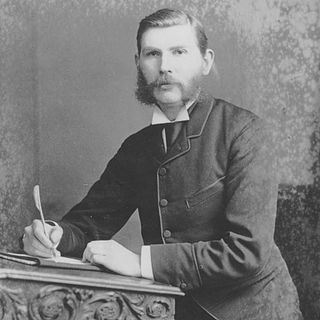A Quote by Eudora Welty
To imagine yourself inside another person... is what a storywriter does in every piece of work; it is his first step, and his last too, I suppose.
Related Quotes
It is difficult for me to imagine what “personal liberty” is enjoyed by an unemployed hungry person. True freedom can only be where there is no exploitation and oppression of one person by another; where there is not unemployment, and where a person is not living in fear of losing his job, his home and his bread. Only in such a society personal and any other freedom can exist for real and not on paper.
The fact that labour is external to the worker, i.e., it does not belong to his intrinsic nature; that in his work, therefore he does not affirm himself but denies himself, does not feel content but unhappy, does not develop freely his physical and mental energy but mortifies his body and his mind. The worker therefore only feels himself outside his work, and in his work feels outside himself.
A person does not...stand motionless and clear before our eyes with his merits, his defects, his plans, his intentions with regard to ourself exposed on his surface...but is a shadow which we can never succeed in penetrating...a shadow behind which we can alternately imagine, with equal justification, that there burns the flame of hatred and of love.
No thought, no idea, can possibly be conveyed as an idea from one person to another. When it is told it is to the one to whom it is told another fact, not an idea. The communication may stimulate the other person to realize the question for himself and to think out a like idea, or it may smother his intellectual interest and suppress his dawning effort at thought. But what he directly gets cannot be an idea. Only by wrestling with the conditions of the problem at first hand, seeking and finding his own way out, does he think.
Slowly but surely I have been soaking Rilke up these last few months: the man, his work and his life. And that is probably the only right way with literature, with study, with people or with anything else: to let it all soak in, to let it all mature slowly inside you until it has become a part of yourself. That, too, is a growing process. Everything is a growing process. And in between, emotions and sensations that strike you like lightning. But still the most important thing is the organic process of growing.
Christ and his benefits go inseparably and undividedly... Many would willingly receive his privileges, who will not receive his person; but it cannot be; if we will have one, we must take the other too: Yea, we must accept his person first, and then his benefits: as it is in the marriage covenant, so it is here.
Good work is no done by "humble" men. It is one of the first duties of a professor, for example, in any subject, to exaggerate a little both the importance of his subject and his own importance in it. A man who is always asking "Is what I do worth while?" and "Am I the right person to do it?" will always be ineffective himself and a discouragement to others. He must shut his eyes a little and think a little more of his subject and himself than they deserve. This is not too difficult: it is harder not to make his subject and himself ridiculous by shutting his eyes too tightly.




































